Showing 151–160 of 262 results

Noted Indian philosophers present an open-minded evaluation of Wittgensteins philosophy of language from fresh perspectives to bring out its contemporary significance. They examine Wittgensteins theories on the limits and structure of language, operationalism in philosophy of language, idea of a private language, necessity of mathematics and logical truths, and grammar of the language of emotions.
The book is open-minded evaluation of Wittgensteins philosophy of language from fresh perspectives to bring out its contemporary significance. Including papers presented by noted Indian philosophers at a naional seminar, it examines the special place of WIttgenstein in the development of philosophy in the West in the twentieth century. The papers offer an in-depth critique of Wittgensteins theories on the limits and structure of language, operationalism, in philosophy of language, idea of a private language, necessaity of mathematics and logical truths, grammer of the language of emotions and language as a liberating force. Throughout the attempt is to analyse Wittgensteins contributors vis-a-vis Indian philosophical thinking and trace and the similarities between him and Indian thinkers. The work, for instance, includes a detailed study of Wittgensteins notion of silence and its affiliations with silence as interpreted in the Nyaya system and identifying the common factors in Gandhi and Wittgensteins approach to western civilisation. It also presents a radically different understanding from what is traditionally understood of the Wittgensteinian concept of picture. The work will prove immensely useful to scholars concerned with linguistic representation and meaning in general and Wittgensteins contributors to philosophy of language in particular.
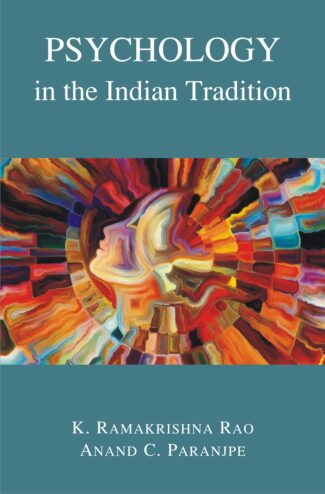
This authoritative volume draws the contours of Indian psychology, describes the methods of study, defines the critical concepts, explains the central ideas, and discusses their implications to psychological study and application to life.
Professors Ramakrishna Rao and Anand Paranjpe are two distinguished psychologist-philosophers who pioneered what has come to be known as Indian psychology. In this authoritative volume, they draw the contours of Indian psychology, describe the methods of study, define the critical concepts, explain the central ideas, and discuss their implications to psychological study and application to life.
The main theme is organized around the theme that psychology is the study of the person. They go on to present a model of the person as a unique composite of body, mind, and consciousness. Consciousness is conceived to be qualitatively and ontologically different from all material forms. The goal of the person is self-realization, which consists in the realization of the true self as distinct and separate from the manifest ego. It is facilitated by cultivating consciousness, which leads to some kind of psycho-spiritual symbiosis, personal transformation, and flowering of ones hidden human potentials.
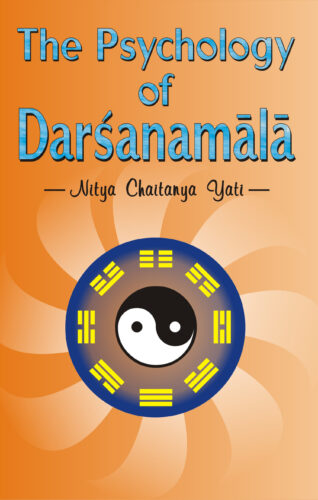
The Darsanmala, consisting 100 verses lucidly expresses Narayana Gurus unitive vision in expounding the core of Vedantic wisdom. Here, Guru Nitya, masterfully examines this wisdom from the psychological point of view to address basic questions of human psychology like how does one experience the world, the link between I, the experiencer, and that which is experienced, etc.
The Darshanmala, one of the last major works of Narayana Guru, contains 100 verses lucidly expressing the guru’s unitive vision expounding the core of Vedantic wisdom. Here, Guru Nitya Chaitanya Yati, using his deep scholarship in western psychological thought, masterfully examines this wisdom from the psychological point of view to address basic questions of human psychology like how does one experience the world, the link between I, the experiencer, and that which is experienced and the way in which one can guide one’s actions. Referring to western thinkers including Carl Jung, St John of the Cross and Kierkegaard, Guru Nitya Chaitanya Yati explores Narayana Guru’s absolutist vision to present insights into such items as consciousness, illusion, yoga, existence, awareness, consciousness and contemplative devotion and liberation. Referring to the thought and philosophy of Greek and other western philosophers and ancient scriptures on Advaitic philosophy, the commentary, simple in language and easy-to-understand, incorporates the perspectives and vision derived from the author’s guru, Nataraja Guru, who had translated the entire poem Darshanmala into English.
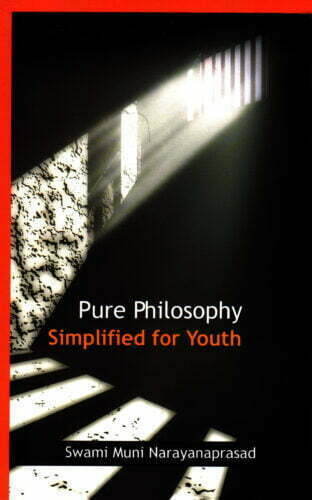
A textbook meant for the youths, throws light on the problems and principles of virtuous life of a man. It talks about one’s existence, birth and death, some guidelines towards a virtuous life, self-restraint, right understanding, action, living, etc. Also speaks about some moral instructions, goal of life, religion and prayer, etc.
This small book was originally meant to be a textbook on Philosophy, to be used in undergraduate studies in all Indian universities, if made a compulsary subject. The compelling necessity of doing so is made clear in the Introduction. Even otherwise, all the educated youth will find this book useful as a guide in life. Fully grown-ups and even elders will find it beneficial to lead themselves and their children.
The first five chapters answer all the fundamental problems of life based simply on our common sense and love of truth. The next five chapters teach us how to live in the light of this understanding. The latter half also contains some of the universally acceptable moral teachings culled from world religions.

Examining the relation between religion and ecological concern in Hinduism, the book covers aspects like the ecological implications of pilgrimage, worship of earth and river goddesses, and Vedanta and Tantra theologies. It discusses how traditional ideas affect contemporary Indian thought.
Examining the relation between religion and ecological concern in Hinduism from textual, theological, anthropological, feminist, and eco-activist approaches, this volume brings together an international, interdisciplinary group of scholars. The book covers the most relevant aspects of the Hindu tradition, searching out the ecological implications of pilgrimage and sacred geography, earth and river goddesses, the beliefs and ritual practice of villagers, caste consciousness and Vedanta, Tantra, and Goddess theologies. The book considers, in a thoughtful and analytical way, a timely issue: how important and basic traditional ideas like asceticism, karma and rebirth, and purity and impurity influence contemporary Indian thinking about the environment. It has an impressive and diverse array of contributors, and there is a nice balance of theory and fieldwork. It shows well how India is sacred ground (and water).
The founding fathers of the quantum revolution were deeply invested in questions of meaning. Distanced from theology but also from the deterministic objective Materialism of the classical model of physics, several of them, including Bohr, Heisenberg, Pauli, Schrödinger and Bohm looked to Eastern philosophies for explanations. This search for meaning beyond church and clockwork seems to have stagnated in our times. Yet, recent advances in physics and the reinterpretation of historic experiments have given us new ways to understand and ask fundamental philosophical questions. These approaches include further considerations of the Copenhagen Interpretation of Bohr, Heisenberg and others, the Transactional Interpretation of John G. Cramer and Ruth Krastner, Quantum Bayesianism (QBism) of Fuchs, Schack and David Mermin; questions related to the meaning of observation and measurement; the Orthodox view of quantum mechanics; collapse of the wave function and time and quantum field theory. The present volume brings together a number of these approaches discussed by leading contemporary physicists. It also expands the consideration of the quantum revolution to include its larger implications for philosophy, mathematics, biology and global understanding, reopening the questions of consciousness and meaning which occupied the minds of the early thinkers of Quantum Mechanics.
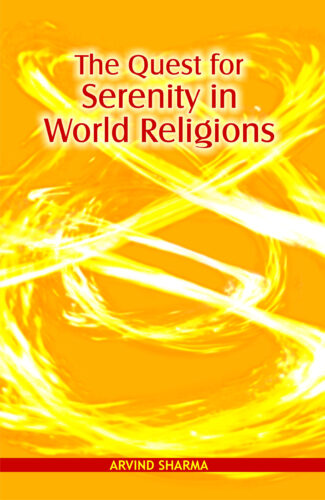
This book describes the search for serenity as found in what are conventionally referred to as the world religions and identifies a similarity in the pattern which seems to underlie these approaches, thereby extending the application of the comparative method to religious psychology.
Every religion, even ideology, needs to provide its followers with ways of coping with the vicissitudes of life, especially when personal tragedy tears a gaping hole in the fabric of meaning. This book describes the search for serenity as found in what are conventionally referred to as the world religions and identifies a similarity in the pattern which seems to underlie these approaches, thereby extending the application of the comparative method to religious psychology.

Goutam Ghosal tells lucidly the magic pairing story of two of the ever renowned poets of India Tagore and Sri Aurobindo. Both these poets are in love with the oppressed earth wishing it to change one day into a beautiful planet. They are not satisfied with God, sitting high above in the blue, and wish to bring Him down on this polluted and plundered globe.
The link between Tagore and Sri Aurobindo has been too insufficiently explored. There is no book as yet in English, which has attempted to integrate the two makers of the modern Indian tradition. One searches in vain for a critical comparative study of the two writers in any other Indian language. The book traces back the formative influences of the two mighty Bengalees growing up almost together without any interaction between them till the first decade of twentieth century. While Tagore took a direct initiative in meeting the yogi in Pondicherry, Sri Aurobindo wrote about his contribution silently listing him as one of the pioneers of the future poetry along with Whitman, Carpenter and others. Basically, both poets are in love with this oppressed earth, wishing it to change one day into a beautiful planet. The Divine is certainly an engaging passion for both of them. But they are not quite satisfied with God who stays far away from us hidden in the high far blue. They wish to catch Him in the net of their poetry and love and bring Him down here on this polluted and plundered globe. Dreamers of a new creation on earth, they wish to form a rainbow bridge marrying the soil to the sky. Goutam Ghosal tells the story of that magic pairing lucidly, keeping the balance throughout. He seeks for an integral view of the two masters, which comes out through his observations on their poetry and fiction, drama and criticism, letters and casual notes. A new approach to Tagore’s music and painting is an added charm of the book.
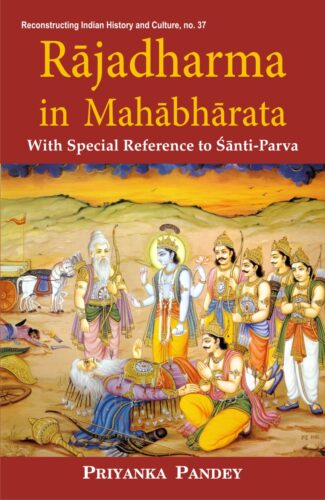
This book deals with all aspects of politics based on Mahabharata and addresses topics such as dandaniti, origin of state, the seven elements of state, functions of state, types of state, kinship, judiciary and administration in detail, among many other issues of political importance.
The idea of politics hardly finds an expression elsewhere as clearly as in Mahabharata. This work thus investigates the political thought explicit in Shanti-Parva and emphasizes that Mahabharata is a text in the study of politics, apart from the perception of it being a great epic and a text of high literary value. Whatever be the notion of politics we contemplate upon, it finds an articulation in Mahabharata. As the Greek tradition of thinking is the base of Western politics, Shanti-Parva of Mahabharata represents the Indian notion of political thinking, though there remain many similarities and dissimilarities between the two systems.
This volume navigates one to how to read Mahabharata as a political text; the idea of political thoughts, the constituting principles of politics and the political institutions in Shanti-Parva; and the relevance of these political thoughts in modern time. Topics such as dandaniti, origin of state, the seven elements of state, functions of state, types of state, kinship, judiciary and administration are discussed in detail, among many other issues of political importance.
The book collects, analyses and examines the internal evidences from Shanti-Parva and also from other parvans of Mahabharata to reach a decisive conclusion, making the work a composite result of textual analysis, related literature and subjective contemplation. It clearly shows that the idea of politics is not separated from the idea of ethics. Rather they are intertwined.

?????: ??????????????? ?? ?? ??????, ???? ??? ????? ?? ????? ?? ???? ??, ???? ??? ?? ?????? ????? ?? ???? ?? ???? ???? ?? ????? ???? ?? ?? ????? ???????? ?? ?????-???? ??, ??????? ????? ??????? ?????? ?? ???? ???? ???? ??, ??????? ?????? ??????? ??? ??? ?? – ?????? ??????? ?? ????? ?????? ???? ?????-??????? ??? ??? ???? ??????? ?? ????????? ?? ?? ?? ??? ??? ????? ???? ????? ?? ????? ??? ?? – ???????-????????
??????????????? ?? ?? ??????, ???? ??? ????? ?? ????? ?? ???? ??, ???? ??? ?? ?????? ????? ?? ???? ?? ???? ???? ?? ????? ??????? ???????? ?? ??? ??, ??? ???????? ?? ???? ?? ?????????? ???? ???? ???? ???????? ?? ???????, ???????, ?????????? ?? ????????????? ?? ????? ???? ?? ?? ????? ???????? ?? ?????-???? ??, ??????? ????? ??????? ?????? ?? ???? ???? ???? ??, ??????? ?????? ??????? ??? ??? ?? µ ?????? ??????? ???????? ?? ??????? ??? ????? ???? ??? ?????? ???????? ???? ??? ??? ?????? ???? ???? ??? ???? ???? ???? ??? ?? ????? ?????? ???? ?????-??????? ??? ??? ???? ??????? ?? ????????? ?? ?? ?? ??? ??? ????? ???? ??????? ?? ???????? ?? ?????? ?? ???? ??????? ?? ??? ??? ?????? ???? ??????? ??? ????? ?? ????????? ?? ???? ??? ??? µ ??? ?? ??? ??? ???, ??? ?? ?????? ??? ? ??? ?????
| There are no products |